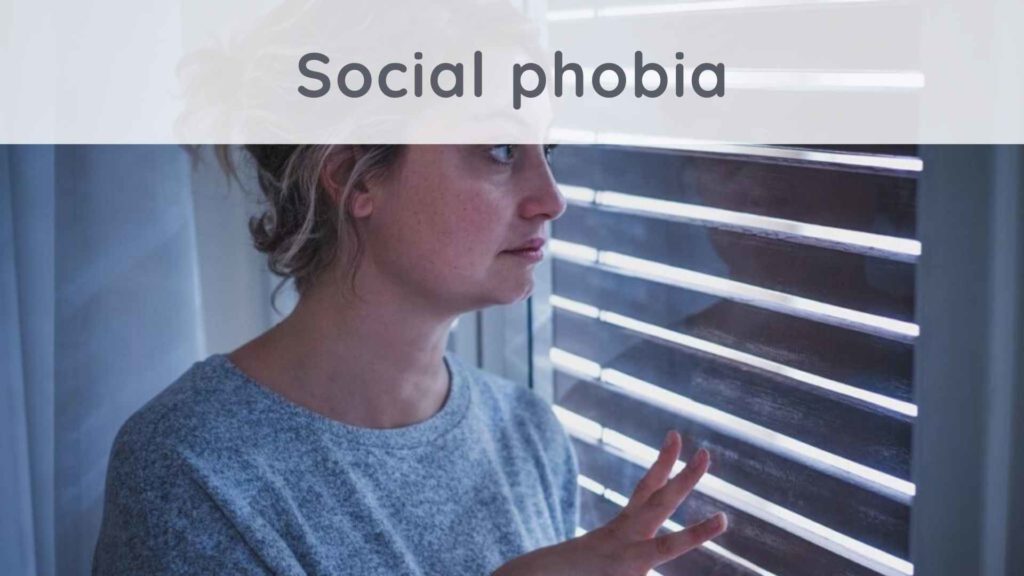Social phobia: how can you no longer be afraid of others?
Written by: Loris Vitry (holistic coach)
Validated by: Cathy Maillot (Osteopath)
Caution: If you have any medical questions or concerns, please speak to your doctor. Even if the articles on this site are based on scientific studies, they do not replace professional medical advice, diagnosis or treatment.

Social phobia is classified in the broad category of anxiety disorders.
It represents a fairly specific form of anxiety which requires a medical diagnosis to be established.
However, it is not an incurable disorder, it can be cured.
Social phobia : how to to cure it ?
We talk about it in this article.
Description of the person with social phobia
Social phobia is also called social anxiety disorder.
It affects between 2 and 4% of the population.
It is part of Obsessive Compulsive Disorders (OCD), in the same way as post-traumatic stress.
People with this disorder have an intense fear of any situation that presents itself to them.
When they find themselves in front of the gaze of those around them, they then feel a deep anxiety.
This is even more noticeable when they have to speak in public or in a group.
Sometimes, this anxiety also manifests itself when they notice that they are being observed by strangers.
By being afraid of being exposed to the eyes of others and consequently to their judgments, the person who suffers from social anxiety is afraid of acting in the wrong way.
She is afraid of disappointing others or doing things that might be perceived as embarrassing or humiliating.
This causes a very significant discomfort which ultimately leads to social isolation so as not to find himself or herself in this kind of situation again.
Very often, these people have a low self-esteem.
The causes of social phobia
The causes of social anxiety disorders are diverse.
Genetic factors
Some studies report a family risk.
It is estimated that a family member can easily suffer from social anxiety if one of the other members had suffered from the same disorder.
The study was carried out on monozygotes of identical twins.
It showed that if one of the monozygotes suffers from social phobia, the second has a 12.6% chance of being affected.
When, on the other hand, they are different twins or dizygotes, the percentage decreases to 9.8%.
Educational, psychological, neurobiological and environmental factors
Each of these factors may play a role in the development of social phobia in an individual.
Parental overprotection, weak interaction with the outside world or a traumatic experience in particular.
Stress
Obviously, this is one of the most certain causes of social anxiety.
In fact, stress is often linked to anxiety.
It arises from excessive and relevant fear and worry.
A disturbance in the neuromediators
Here, the noradrenergic system no longer works properly.
The same is true for the dopaminergic system, which then experiences very low activity.
Hormonal disturbances
Once again we find the stress factor.
Imbalanced levels of cortisol (the stress hormone) can cause social phobias.
Complications and disorders associated with social phobia
Before getting to the complications of social anxiety, let us note that this disorder is to be distinguished from stage fright.
Stage fright, unlike social phobia, is a normal state of mind.
It occurs when the person has never done something they must do, such as debating a subject in public or giving arguments.
Stage fright can also occur before an important examination.
In addition, the stage fright quickly disappears after the situation has passed.
This is obviously not the case with social anxiety disorders.
Here, after speaking in public, the person suffering from such an anxiety disorder will be ashamed of themselves.
She can even sometimes becomes totally powerless by having a panic attack.
Complications of social anxiety
It is the quality of life that is completely degraded.
This disorder has repercussions on his social, romantic and professional life.
This person will for example find it difficult to stay with colleagues or to participate in meetings at the office.
Suicidal thoughts may also come to mind.
Associated disorders
Depression, well known for its disastrous effect on anyone who suffers from it, is one of the disorders that arises as a result of an untreated social phobia.
We can also mention the fear of the crowd, namely agoraphobia or the fear of blushing in public or ereutophobia.
And unfortunately sometimes, the person may be tempted to consume alcohol or substances with anxiolytic properties.
How to treat yourself to cure social phobia?
The first step in seeking treatment for a cure is to go to a doctor.
The latter will establish a diagnosis and may refer the person to a specialist.
However, there is no need to perform laboratory tests or imaging tests.
Treatment can be in the form of therapy or medication.
Therapy for social anxiety
Different psychotherapies have proven to be very effective on patients such as cognitive behavioral therapies, psychoanalytic therapies or exposure.
Assertiveness, relaxation and cognitive restructuring have also been proven to help diminish the disorder.
Cognitive behavioral psychotherapy
The therapist helps the person to gradually face their fears.
He exposes her to the situations she dreads, works on her emotions and her thoughts so that she can achieve a certain number of objectives in order to eradicate the social phobia.
In particular, she will have to learn to eliminate stress with relaxation.
Assertiveness
Therapies to promote assertiveness are very useful against social anxiety disorders.
They consist in helping the person to be able to express themselves easily, to be able to give their opinion on a particular subject.
Role playing is very often used to get there; these sessions therefore take place in groups.
Drug treatment for social anxiety
It comes to reinforce the therapy.
Social phobia medications are used to reduce negative emotions and thoughts, as well as the physical symptoms of the disorder.
Antidepressant drugs are often the recommended medications.
Certain anxiolytics are also used, but occasionally.
However, their use can reinforce avoidances.
It can also prevent the different phases of exposure in the patient.
Anyone can suffer from social phobia.
When this happens, it is important to seek assistance in order to find the best care.
A combination of therapies and drug solutions can help find relief.
Continue reading:
Fear of abandonment : how to overcome the phobia of being abandoned ?

